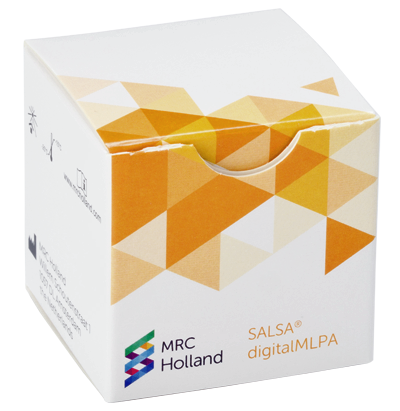Germline defects in the APC gene are the most frequent cause of a hereditary predisposition to polyposis colon cancer, which can present as familial adenomatous polyposis (FAP), attenuated FAP (AFAP), or gastric adenocarcinoma and proximal polyposis of the stomach (GAPPS). In addition, acquired mutations in the APC gene are an initiating event for sporadic colorectal tumour development. Most FAP patients develop adenomatous colonic polyps in the first two decades of life and in untreated individuals this progresses into colonic cancer at an average age of 39 years. APC-related colorectal cancer (CRC) is a dominant trait. Approximately 4% of (A)FAP patients have a somatic mosaic APC mutation, which increases to ~20% when only de novo cases are considered. More information on APC-associated polyposis is available at http://www.ncbi.nlm.nih.gov/books/NBK1345/.
Among the various defects in the APC gene that have been found in patients, are deletions and duplications of complete exons, which are usually missed by standard sequence analysis. The MLPA technique can detect most of these deletions and duplications and therefore complements sequence analysis of the APC gene. It is expected that 8-12% of all APC mutations in most populations are large rearrangements that can be detected with this MLPA probemix (Jarry et al. 2011; Kerr et al. 2013). Of note, several clinically relevant rearrangements of only the APC promoter region are reported and have been associated with FAP (Snow et al. 2014; Kadiyska et al. 2014; Kalbfleisch et al. 2015; Marabelli et al. 2017), all of which can be detected with this probemix.
Mutations in the MUTYH gene also result in a hereditary predisposition to colon and gastric cancer, which is referred to as MUTYH-associated polyposis (MAP). In contrast to the APC-associated disease FAP, MAP is an autosomal recessive disorder and is considered less severe: polyps do not appear until adulthood and are less numerous than those found in patients with APC gene mutations. Nevertheless, phenotypes of APC- and MUTYH-related CRC partly overlap. Therefore, six probes for the MUTYH gene are included in this P043-E1 APC probemix, two of which will only generate a signal when the common c.536A>G (p.Tyr179Cys) or c.1187G>A (p.Gly396Asp) mutations are present. The c.536A>G (p.Tyr179Cys) and c.1187G>A (p.Gly396Asp) variants are carried by ~1%-2% of the general population and account for ≥90% of all MUTYH pathogenic variants in northern European populations. Up to 70% of MAP patients harbours at least one of these variants (Aretz et al. 2013). Since the MUTYH gene is small (11 kilobases (kb)), the four copy number detection MLPA probes are expected to detect a substantial part of MUTYH copy number changes. For instance, the most frequent CNV in MUTYH – a deletion of exon 4-16 that is reported in multiple patients (Castillejo et al. 2014) – can be detected with two probes in this probemix. More information on MAP is available at GeneReviews: MUTYH Polyposis. For complete exon coverage of MUTYH the SALSA MLPA Probemix P378 MUTYH is available.
A recurrent duplication of ~40 kb directly upstream of the GREM1 gene is known to lead to HMPS1. Patients with HMPS1 have a predisposition for developing CRC (Jaeger et al. 2012). Presence of this duplication is predicted to cause reduced bone morphogenetic protein (BMP) pathway activity, a mechanism that underlies tumorigenesis in juvenile polyposis of the large bowel. Several additional duplications in the GREM1 upstream region have been found: e.g. a duplication of the upstream region and the whole GREM1 gene of ~57 kb has been described in one patient with sigmoid colon carcinoma (Venkatachalam et al. 2011); a duplication of ~16 kb has been described in members of a family presenting with atypical FAP (Rohlin et al. 2016); and a duplication of ~24 kb in a patient with multiple colon polyps has been reported (McKenna et al. 2019). Two probes for the relevant region directly upstream of GREM1 are included in this probemix; both probes detect the 40 kb, 57 kb and 24 kb duplications and the 16 kb duplication can be detected by one of these probes (probe number 21272-L23310 at 217 nucleotides (nt)). For extended coverage of the GREM1 region the SALSA MLPA Probemix P378 MUTYH is available. More information on HMPS1 is available at OMIM.






